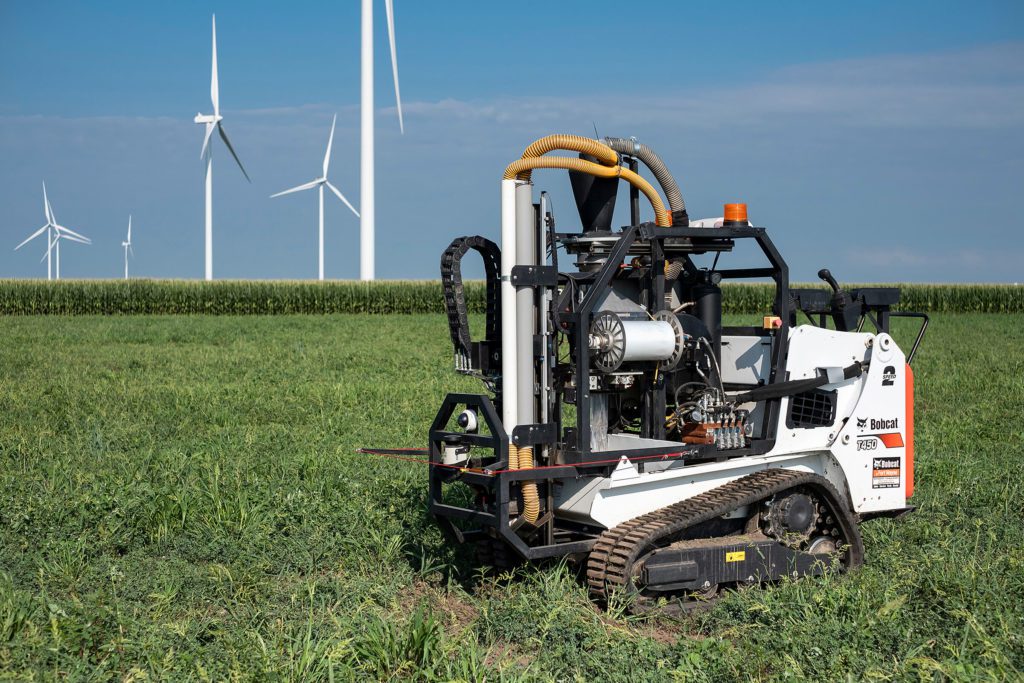Sep 11, 2019Autonomous robots enter fields to collect precise soil samples
Collecting precise soil samples is essential for farmers because a small amount of soil determines the amount of nutrients needed for acres of crops and can determine crop yields.
The U.S. Department of Agriculture reports that soil testing can help farmers increase yields, reduce production costs and prevent surface and groundwater pollution.
“Smartcore,” an autonomous robot developed by a pair of Purdue University College of Engineering graduates, is designed to collect accurate, repeatable soil samples in fields and bring to the edge of the field for shipment to the lab. Troy Fiechter and Drew Schumacher founded Rogo, officially Rogo Ag, a startup to advance the technology and move it to the public.
“Smartcore helps farmers make better strategic decisions,” said Schumacher, Rogo’s president.
Rogo is working with farmers and companies in Indiana, Ohio, Illinois and Iowa, and continues to expand with long-term plans to move into Canada and South America.
SmartCore uses a Bobcat skid steer chassis and navigates fields using boundary algorithms and a variety of obstacle detection sensors. It also is equipped with RTK GPS to ensure that soil samples are taken from the correct spot and can return every season within inches.
The largest and most common source of error in the soil testing process is with collecting the soil sample. Smartcore is unique in using a high-speed, self-cleaning hydraulic auger that collects soil to a precise depth.
“People often think that because you stick a probe 6 inches into the soil that means 6 inches of soil are extracted,” Schumacher said. “But a probe might plug up and you collect less than six inches. Or it might plug up and send a wad of dirt down into the rest of the soil. There are a lot of things that can go wrong if you don’t use the right equipment. Our depth is accurate within an eighth of an inch 100% of the time and it’s fully extracted every time.”
In traditional sampling practices, the variance in-depth and location can lead to a sampling error as high as 20%. In a recent study, Beck’s Hybrids Practical Farm Research group validated an error reduction to 10%. Errors can cause farmers to spend more than necessary on fertilizer, or under apply in certain areas. Reducing the use of fertilizer also reduces the impact on the environment.
“Farmers want to sample from the same location so they can understand how their soil is evolving,” Schumacher said. “If you don’t compare the same soil site season to season, you’re going to have a field that varies a lot. If you want to know what you added to the field and how it is changing the field, you have to compare apples to apples as much as possible.”
Schumacher said most of Rogo’s competitors do soil samples by hand, which he called undependable, but also that it has been the best thing available in the market to this point.
Rogo has been recognized for its innovative technology by Purdue’s Ag-Celerator Fund, Ag Alumni Seed and Elevate Purdue Foundry Fund.
Schumacher said the funding from Purdue-affiliated organizations is important because of the financial boost for research and development, and also the credibility it brings and the validation from those who know farming.
“We’ve seen more interest in what we’re doing. It has started some good conversations that have been valuable,” he said. “We’re always looking to serve more farmers and more retailers so we can continue to make a difference.”
The technology aligns with Purdue’s Giant Leaps celebration of the university’s global advancements made in artificial intelligence and sustainability as part of Purdue’s 150th anniversary. Those are two of the four themes of the yearlong celebration’s Ideas Festival, designed to showcase Purdue as an intellectual center solving real-world issues.
– Purdue Research Foundation
Above, a pair of Purdue University graduates have founded a company called Rogo Ag LLC, a pioneering agricultural technology company that has developed an autonomous robot called Smartcore. Smartcore is designed to collect accurate, repeatable soil samples in fields and bring the samples directly to the farmers or growers. Photo: Purdue Research Foundation image/Oren Darling















